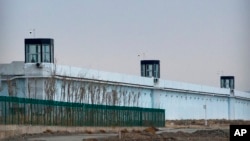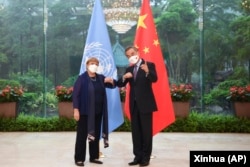A trove of internal and confidential police photos and documents, known as the "Xinjiang Police Files" from within China, has been described as the "largest and most significant leak" to date by the Washington-based Victims of Communism Memorial Foundation. The information provides a window into Beijing's policy and treatment of the Uyghur ethnic minority group, including the detention of Uyghurs in re-education camps. Rights organizations have accused China of crimes against humanity.
In the past, China has repeatedly denied these accusations and called them lies. China's state news agency, Xinhua, has said the vocational training centers serve as "preventive counterterrorism and deradicalization measures."
The data from within Xinjiang police computer networks was leaked to one of the organization's researchers, Adrian Zenz, who shared the content with the International Consortium of Investigative Journalists and other media outlets. Andrew Bremberg, president of the Victims of Communism Memorial Foundation and former U.S. ambassador to the United Nations in Geneva, spoke to VOA Pashto service's Shaista Lami about the Xinjiang police files. The following interview has been edited for clarity and brevity.
VOA: Please shed some light, first of all, on the release of these papers, the leak from Xinjiang police (computer) network. What does it tell the world?
Andrew Bremberg: Yes, this is an unprecedented cache of documents directly from Xinjiang police computer servers. This was a hack, in fact not a leak, that someone kind of smuggled out but a hack of tens of thousands of documents that provide the most in-depth understanding of what is actually happening in Xinjiang over the last several years.
These materials include thousands of photos, the first photos of their kind that show both individuals who have been detained and the internal security operations of how this police state system works in terms of detention. (It) also has thousands of files that show the internal security workings of these detention facilities, as well as personally identifiable information on hundreds of thousands of people from specific counties that show how the government has been tracking and, in many cases, detaining definitely more than 12% of the entire adult population in these counties.
Then, also never before known speeches and remarks by senior officials both from the party and from Beijing directly to those in Xinjiang, admonishing them to continue their basic brutality and telling them why the regime believes it's so important and how committed they are, and that this is a directive from the central government.
So, this information, I think is, as I said, unprecedented and really hope that this will have a dramatic impact on how the U.S. and the world understands and responds to this genocide taking place in China.
VOA: The report comes as the U.N. high commissioner for human rights, Michelle Bachelet, also visited China, kicking off the first trip by a holder of this office since 2005, which is a long time. As she visited the remote Xinjiang region so far, did you have a chance to talk to her, share your concerns in this regard and if yes, what was her reaction?
Bremberg: I spoke with High Commissioner Bachelet about this issue many times previously when I served as the U.S. ambassador in Geneva and repeatedly, I raised the gross human rights violations happening in Xinjiang and the need for her individually and her office to speak out and address these terrible human rights violations that were taking place at the time.
I had in-depth conversations with her about both the importance of a visit by her office to Xinjiang, but equally about the importance of that visit being an open and independent investigation where she would have free access to move and examine what is happening in the region and not potentially be confined or used by the government. … Both from her own office's admission and what we heard from the Chinese government, they seem to agree that this is not an investigation, that it is not transparent and that she is in fact and part of what I believe they referred to as a closed loop, tightly controlled movement.
This, of course, has been explained under the auspices of part of their zero-COVID policy to prevent COVID and to whatever degree that was legitimate was the case, that was all the more reason for High Commissioner Bachelet to not go on this visit. Recognizing that if that's the approach the government's going to take, it means it is impossible for her to have an open visit and investigation.
VOA: Her trip also shows that it's important for her and for her office obviously that she is making this trip, but how did the Chinese government get away with these human rights violations, and how serious of a problem can this be for the Chinese government as far as the possibilities of sanctions on China?
Bremberg: Her office must examine this new evidence that's been presented by this unprecedented file of documents and be included in their report, which also must be immediately released. Her office has been engaged in this investigation for a number of years. That report must be made public immediately after her visit.
Turning to your question about how the Chinese government has gotten away with this, China is a sovereign country and can make decisions about how it treats its citizens on its own. They are the ones responsible for those human rights violations.
But the United States and the rest of the world, we also bear some responsibility as to whether or not we speak out and act in response to those actions taken by China. So, to date, while the United States has taken important steps to speak out against human rights violations, the United States has designated what they are doing in Xinjiang a genocide, very important designation, many other countries have remained silent, and the United States could still do more.
So, the question is in the face of this incredible new evidence that visually confirms for everyone what we've already known or suspected for the last several years, the question is, what will we do? Will we, in freedom-loving countries, democratic countries that profess to believe in and advocate for human rights, will we continue to turn a blind eye or say very little, or will we call out these terrible human rights abuses and more importantly, will we act?
VOA: You mentioned countries being silent and one of those can be Pakistan, which is a big ally to China. Your reaction toward that, which is also a Muslim country, and is witnessing what is happening to the Muslim population minority in China.
Bremberg: It is very disappointing that across the entire Muslim world, among OIC (Organization of Islamic Cooperation) countries, that none has spoken out against this genocide and oppression of Uyghur Muslim minorities in western China, and this has to end. I hope that this new evidence that countries around the world, governments, and their own citizens, will see, will spur those countries to speak out. At the very least, these countries must stop giving in to China's coercion and supposedly defending China's human rights record.
VOA: Besides sanctioning China, what can the international community do for the victims?
Bremberg: There's a lot that the United States and other governments can do in response to human rights violations. You mentioned sanctioning China, but the United States has sanctioned several high-level individuals from the Xinjiang region. But the evidence that we've uncovered showed that, as we suspected, these directives have come from Beijing, from the central government. We have the names of individuals that, starting with Xi Jinping on down, that have directed these activities. So the United States can add many more people to the list of those sanctioned including the central government leadership, both in Beijing and their party leadership in Xinjiang, that absolutely should be sanctioned for these human rights violations that they are personally accountable for.
The United States also passed the Uyghur Forced Labor Prevention Act last year that goes into effect next month and the question will be, how vigorously does the U.S. enforce this new law? This new law prohibits the importation of any goods from Xinjiang off of the presumption that they are de facto made from forced labor. That is a really important statement that our country has made. But will it be enforced? That's a critical question the United States must lead on.
We need the United States and other countries around the world to put forward resolutions in the (U.N.) Human Rights Council body to condemn these human rights violations taking place in China today.
This interview was conducted by VOA Pashto Service's Shaista Lami. VOA's Elizabeth Lee contributed.






